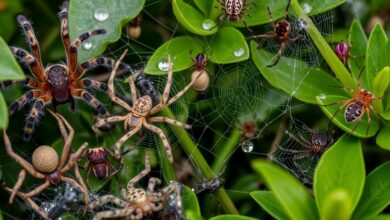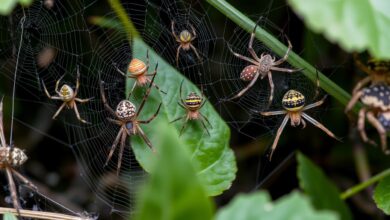Discover Spiders in Australia: Your Arachnid Guide
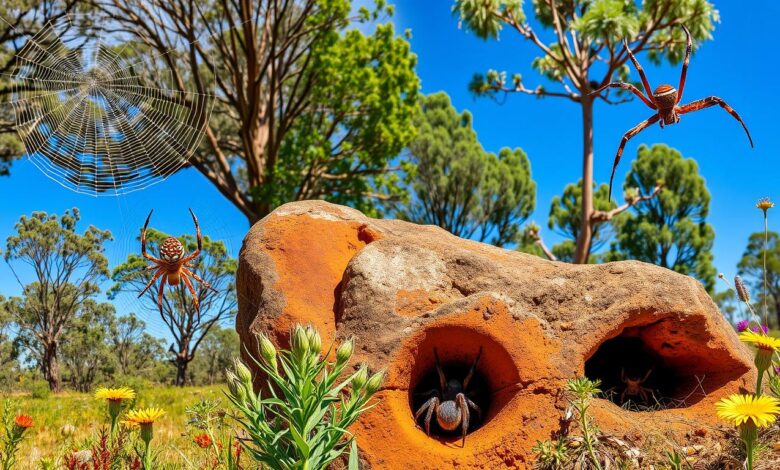
Australia is home to many spider species, including the Sydney funnel-web spider and the garden orb-weaver. This guide will introduce you to the world of Australian spiders. You’ll learn how to identify and safely live with these fascinating creatures.
If you love nature, are curious about wildlife, or just find spiders interesting, this guide is for you. It will take you on a journey through Australia’s spider world. You’ll discover both venomous and harmless spiders and their roles in the ecosystem.
Learn about the unique patterns, hunting ways, and features of Australian spiders. Find out where they live, from cities to countryside. You’ll also learn how to peacefully share your space with these amazing creatures.
As you read on, myths about Australian spiders will be debunked. You’ll gain a deeper understanding of these often-misunderstood arachnids. Discover the wonders of spiders and their crucial role in Australia’s ecosystem.
Venomous Spiders in Australia
Australia is home to many dangerous spider species. The Sydney funnel-web spider and the redback spider are two of the most venomous. Knowing about these spiders helps keep you safe in Australia.
Sydney Funnel-web Spider
The Sydney funnel-web spider is found in eastern Australia’s coastal areas. Its venom can be deadly to humans. It has a shiny black body and big fangs.
This spider is aggressive and quick to react. It stands its ground when threatened.
Redback Spider
The redback spider is related to the black widow. It’s smaller than the funnel-web but still dangerous. Its red stripe and round body make it easy to spot.
Its venom can cause severe pain and muscle paralysis. If not treated, it can lead to respiratory failure.
Knowing about these spiders is key. Proper identification and caution are important. Seek medical help right away if bitten.
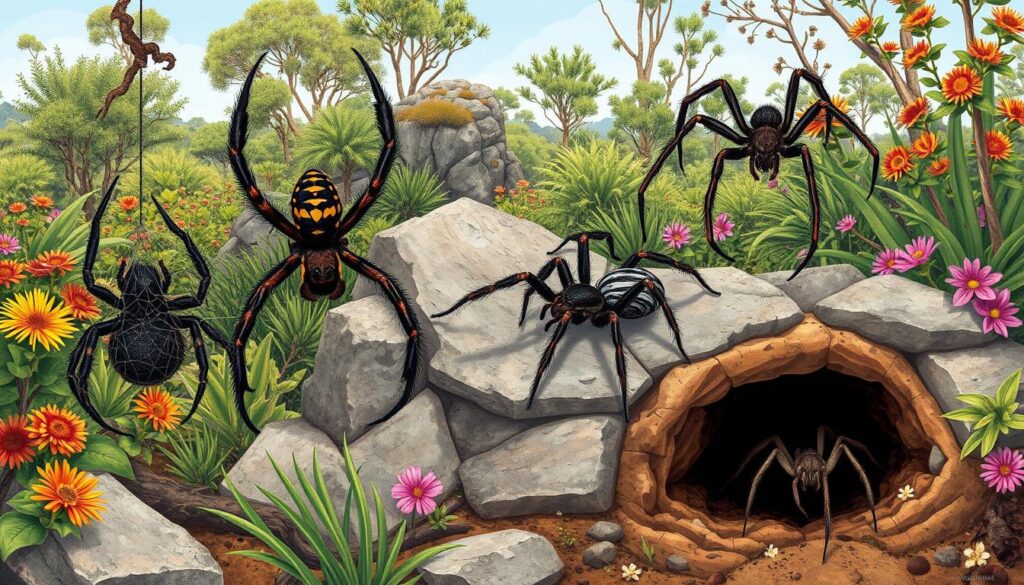
Identifying Australian Spiders
Learning to identify Australian spiders is important. It helps you know their behavior and any dangers they might pose. You can tell different spiders apart by their size, color, and unique markings.
Size, Color, and Markings
Australian spiders vary greatly in size. You might see a tiny Jumping Spider or a big Huntsman Spider. Look at the spider’s body size and leg length to guess its type. Also, the spider’s colors and patterns can give you clues. For example, the Redback Spider is known for its distinctive look.
Web Patterns and Habits
Spiders’ webs can also tell you what kind of spider it is. Some, like the Orb-Weaver Spider, have complex webs. Others, like the Sydney Funnel-web Spider, have funnel-shaped traps. Watching how a spider behaves and where it lives can also help identify it.
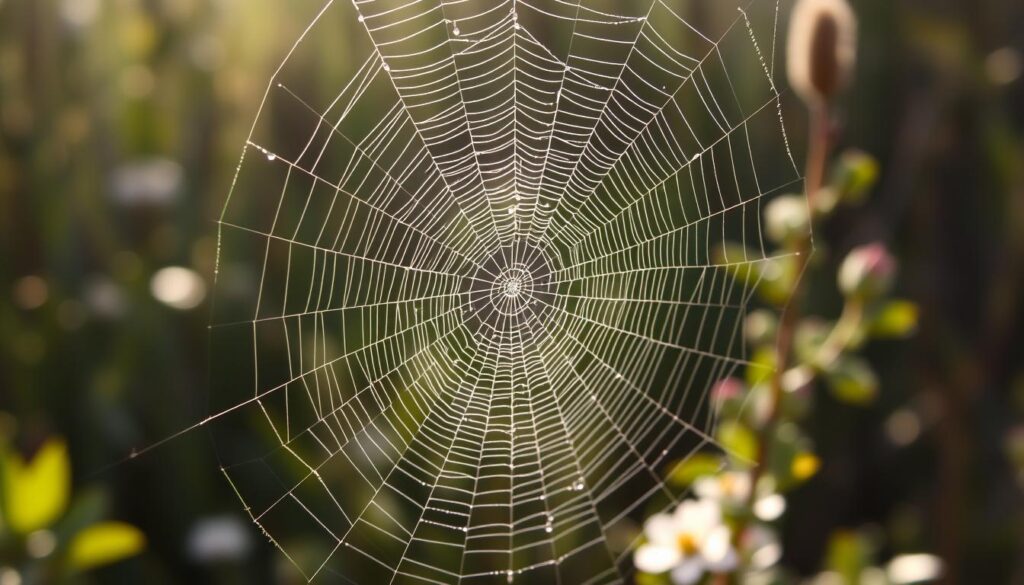
By learning these key features, you’ll get better at spotting the many spiders in Australia.
Australian Spider Species
Australia has a wide variety of spider species. Each one has its own special traits and ways of acting. Huntsman spiders and wolf spiders are two examples that show the amazing diversity of spiders in Australia.
Huntsman Spiders
Huntsman spiders are big and fast. They are a common sight in Australia. They can quickly move across walls and ceilings, surprising people.
They have wide bodies and long legs. This helps them fit into tight spaces like under bark. Huntsman spiders make their homes in these places.
Wolf Spiders
Wolf spiders don’t make webs like many other spiders. Instead, they hunt their prey. They are found all over Australia, from tiny to quite large.
Wolf spiders have great eyesight and can run fast. They use these skills to catch insects and small animals.
But Australia is not just about huntsman and wolf spiders. There are many other australian spider species. From the delicate orb-weavers to the dangerous funnel-web spiders, Australia’s spiders show the beauty of its nature.

Spiders in Australia
Spiders are key to Australia’s ecosystem, acting as both predators and prey. They help control insect numbers and are a food source for other animals. Spiders in Australia come in many species, each with its own traits and ways to adapt to different habitats.
Australia is home to many spiders, like the Huntsman, Redback, and Sydney Funnel-web. These spiders have amazing webs, hunting methods, and behaviors. They fascinate both nature lovers and scientists.
Spiders are important for the environment. They are not just interesting to watch but also help keep the ecosystem balanced. By learning about spiders in australia and their australian spider facts, we can see how they support the country’s unique landscapes.
| Spider Species | Characteristics | Habitat |
|---|---|---|
| Huntsman Spider | Large, flat-bodied, and fast-moving | Found in various environments, including homes, gardens, and forests |
| Redback Spider | Distinctive red hourglass marking on its abdomen, highly venomous | Common in urban and suburban areas, often found in dark, sheltered spaces |
| Sydney Funnel-web Spider | Robust, hairy, and highly aggressive, with a potent venom | Native to the Sydney region, typically found in moist, sheltered areas |
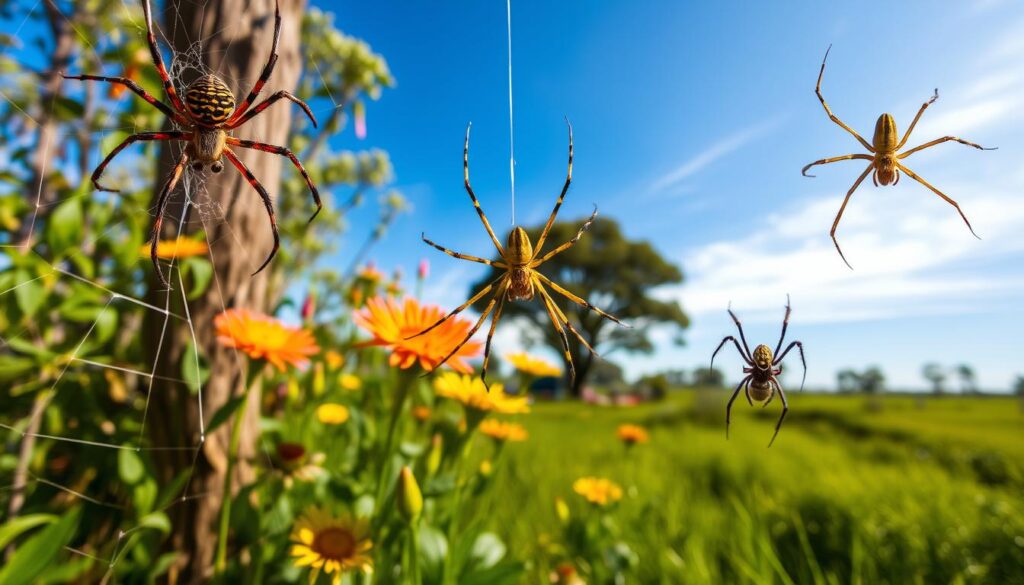
By learning about spiders in australia and their australian spider facts, we can appreciate the web of life in this country. It’s a way to understand the beauty and diversity of Australia’s landscapes.
Spider Habitats in Australia
Australia’s varied landscapes are home to many spiders. They live in cities and rural areas alike. Knowing where spiders like to live helps us understand their role in the ecosystem.
Urban and Rural Locations
Some australian spider habitats are in cities, while others are in the countryside. The Huntsman spider is found in both places. It uses the city’s resources and the countryside’s natural areas.
Wolf spiders and Orb-weaver spiders like natural spots like gardens and forests. These places offer them food and space to spin their webs.
| Spider Habitat | Preferred Locations | Adaptations |
|---|---|---|
| Urban Areas |
|
|
| Rural Areas |
|
|
Studying spiders in cities and the countryside helps us see their importance. It shows how they fit into Australia’s ecosystems. This knowledge helps us value their role in our environment.

Dangerous Spider Bites in Australia
Most spider bites in Australia are not serious. But, some like the Sydney funnel-web spider and the redback spider can be deadly. Knowing the signs and how to act can keep people and pets safe.
Symptoms and First Aid
Spider bites can cause pain, swelling, and redness. For serious bites, get help right away. While waiting, stay calm, keep the limb still, and use a cool, clean cloth on the bite.
For bites from deadly spiders, like the Sydney funnel-web or redback, do this:
- Call emergency services right away
- Use a pressure immobilization bandage on the limb
- Keep the person calm and still until help arrives
Knowing how to react to dangerous spider bites can save lives. It’s all about being ready and knowing what to do.
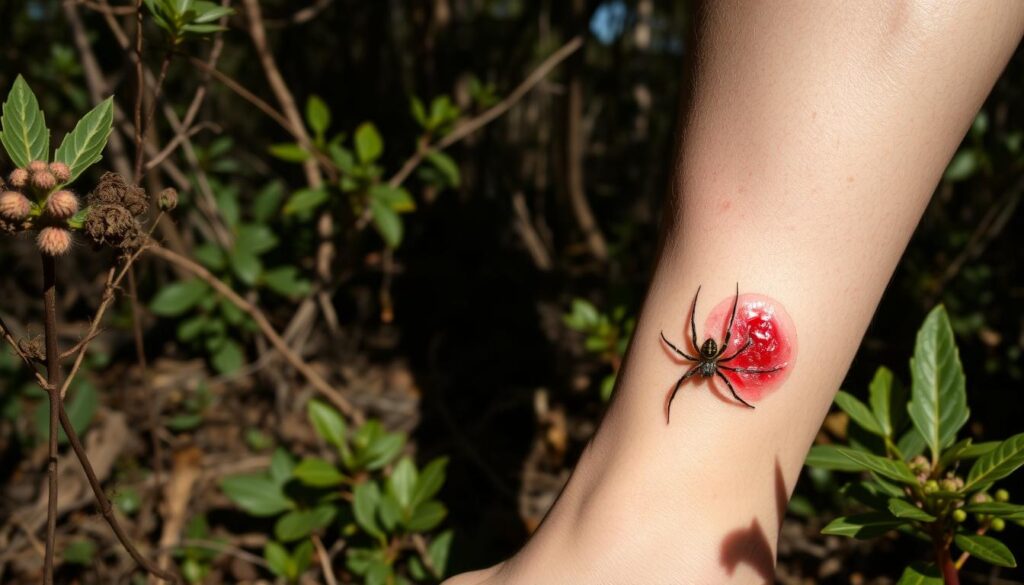
| Spider Species | Symptoms | First Aid |
|---|---|---|
| Sydney Funnel-web Spider | Intense pain, sweating, nausea, vomiting, difficulty breathing | Apply pressure immobilization bandage, call emergency services |
| Redback Spider | Localized pain, swelling, nausea, muscle pain | Apply cold compress, call emergency services |
Spider Control in Australia
Controlling spiders in Australia can be done with natural and chemical methods. Natural ways are good for the environment. But, sometimes, chemical treatments are needed to really tackle spider problems.
Natural Spider Control
Having birds and hedgehogs around can help keep spider numbers down. Keeping your place clean and tidy also helps. Seal cracks, use fine mesh, and trim back plants to make your home less appealing to spiders.
Some plants, like lavender, mint, and citronella, can also keep spiders away. Their strong smells can act as a natural barrier.
Chemical Spider Control
For serious spider issues, chemical treatments might be needed. Use these as a last resort and follow local rules and safety tips. It’s crucial to pick safe and effective products to protect your family and the planet.
| Natural Spider Control Techniques | Chemical Spider Control Techniques |
|---|---|
|
|
Using both natural and chemical methods can help manage spiders in your spider control australia. This approach keeps the environment and your family safe.
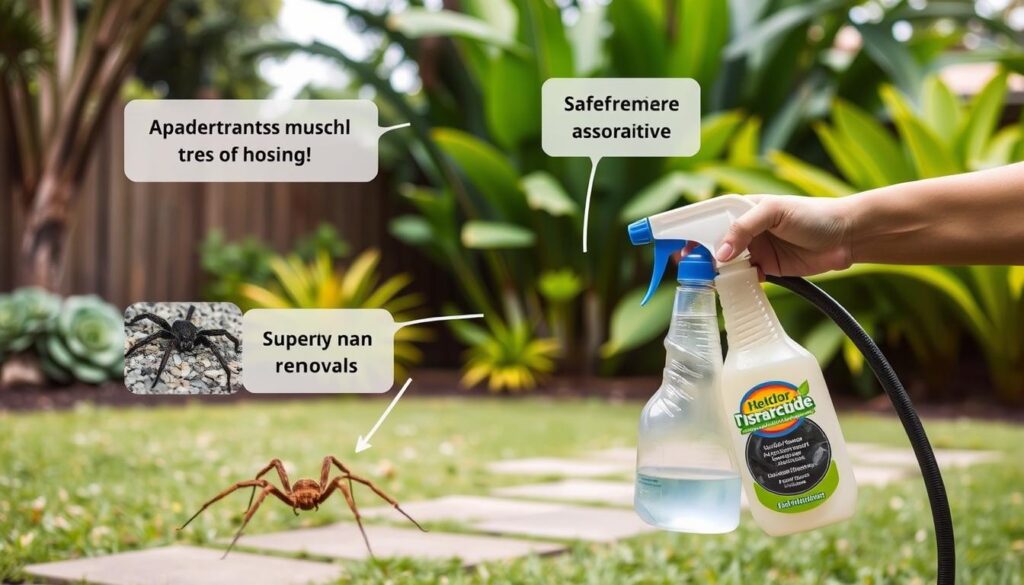
White-tailed Spiders in Australia
Exploring Australia’s arachnid world means running into the white-tailed spider. This spider is common across the country. It’s known for its look and a past belief that its bite was dangerous. But, new studies have changed our view of its venom.
The white-tailed spider is medium-sized, between 10 to 20 millimeters long. It’s famous for the white or cream tip on its abdomen. This gives it its name. The spider’s color can vary, from gray to dark brown, and it looks smooth and shiny.
White-tailed spiders are found all over Australia, from the coast to the outback. They like dark, safe spots like under rocks or in woodpiles. They also live in homes, especially in dark places.
Old stories made the white-tailed spider seem scary. But, new research shows its venom isn’t as strong as thought. Most bites cause only mild pain, swelling, and redness. Still, it’s wise to see a doctor if a bite worries you.
Learning about white-tailed spiders australia helps us see their importance in Australia’s ecosystems. It also reminds us to be careful if we meet them.
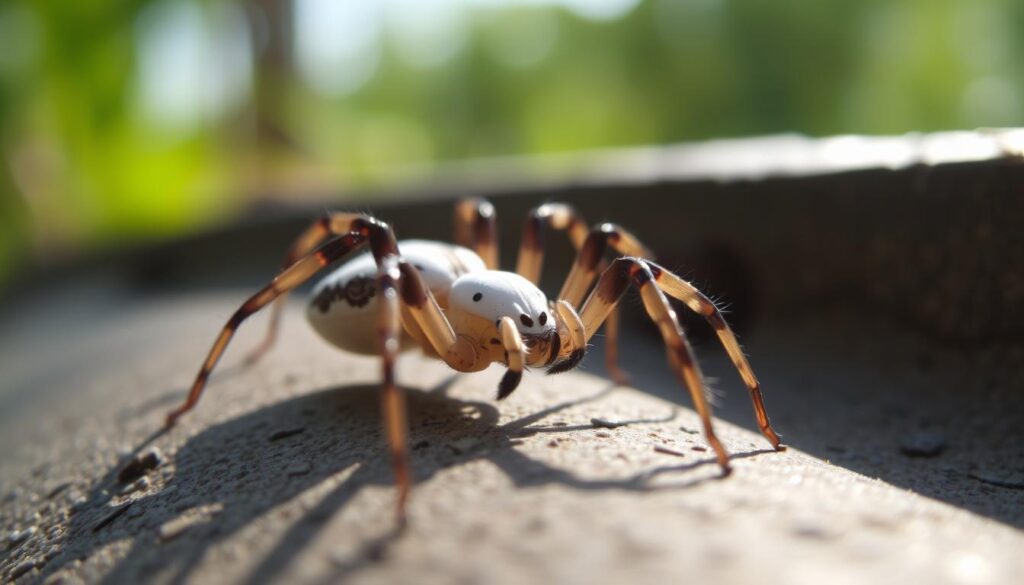
Australian Tarantulas
Australia is home to many fascinating tarantula species. Each has its own unique traits. These spiders are often mysterious and intriguing, captivating many. From their size to their web patterns, Australian tarantulas show us the amazing world of arachnids.
Species and Characteristics
The Selenocosmia crassipes, or Whistling Spider, is well-known. It can grow up to 10 centimeters in body length. Its legspan can be over 20 centimeters. When threatened, it makes a distinct whistling sound.
The Selenotypus plumipes, or Featherleg Tarantula, is another fascinating species. It has feathery leg hairs, making it stand out. Found in eastern Australia’s tropical and subtropical regions, it thrives in diverse habitats.
Australia has many australian tarantula species. Each has its own australian tarantula characteristics. From the Phlogiellus inermis‘ vibrant colors to the Selenocosmia crassipes‘ impressive size, they showcase Australia’s arachnid diversity.
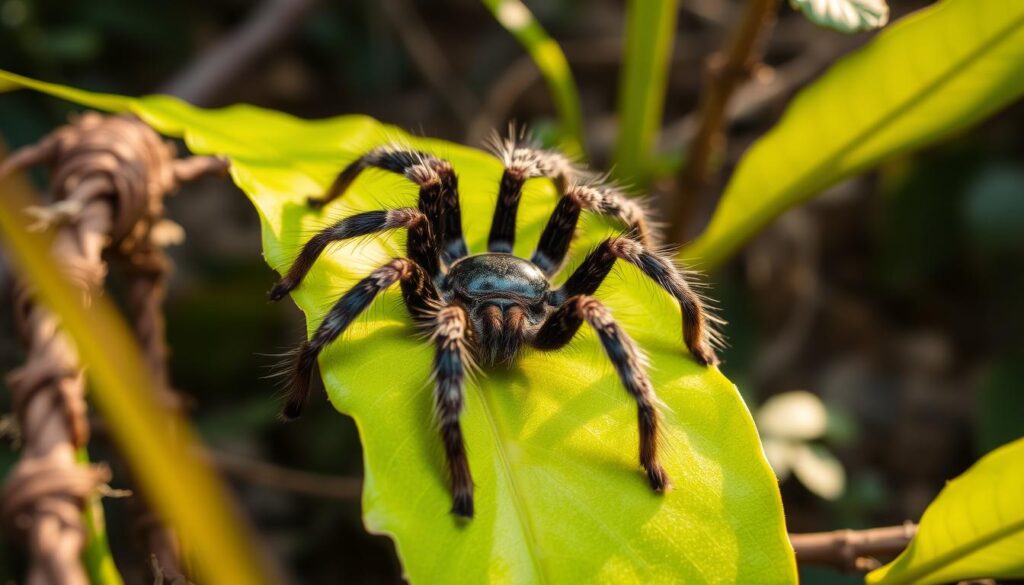
If you love arachnids or just the natural world, australian tarantulas are worth exploring. Learning about their unique features and behaviors helps us appreciate Australia’s biodiversity.
House Spiders in Australia
Many Australian homes have spiders, but they are mostly harmless. Spiders like cellar spiders and recluse spiders are common. They help control bugs in our homes. Let’s learn about the most common house spiders australia and how to live with them.
Cellar Spiders
Cellar spiders, also known as daddy longlegs, are everywhere in Australia. They spin webs in dark spots. These spiders are safe for humans and keep bugs away.
Recluse Spiders
Recluse spiders are also common in homes. They are shy and rarely bite unless they feel threatened. They like to hide, so you don’t see them often.
It’s key to remember that house spiders australia help control pests. By understanding them, we can live in harmony with these spiders.
| Spider Species | Typical Behavior | Venom Potency |
|---|---|---|
| Cellar Spider | Builds delicate, wispy webs in dark corners | Relatively harmless to humans |
| Recluse Spider | Prefers to hide in secluded areas, unlikely to bite unless provoked | Potentially dangerous, but bites are rare |
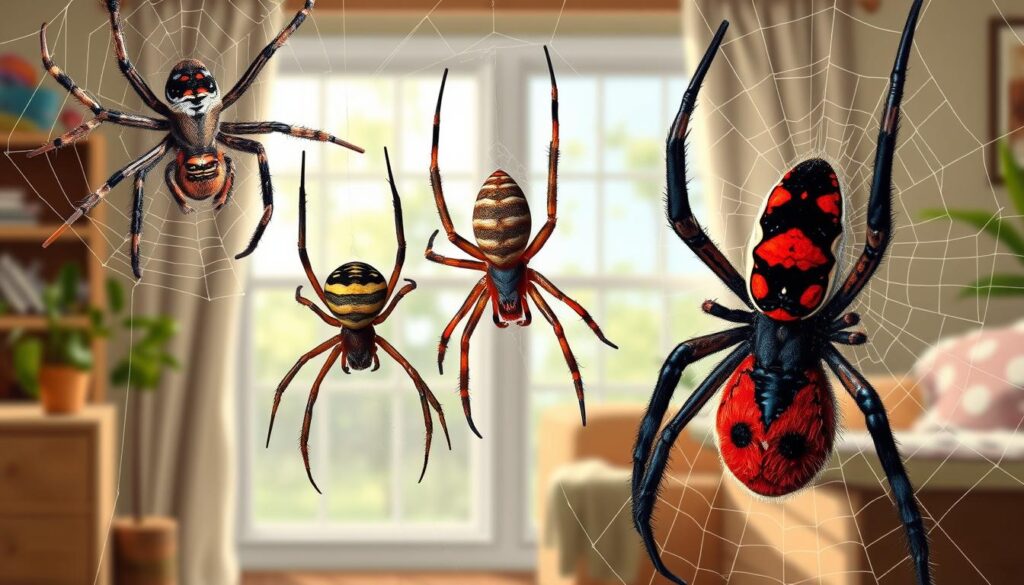
Common Garden Orb-Weaver Spiders
In Australia, a fascinating spider catches the eye – the common garden orb-weaver spider. These spiders are known for their detailed, round webs. They build these webs in gardens and rural areas, showing their amazing skills and helping the ecosystem.
Behavior and Web Construction
Garden orb-weaver spiders have unique behaviors and web-building skills. Their webs are in key spots to catch flying insects. They create webs with circles and lines, making a beautiful pattern.
Building their webs is a sign of their engineering skills. They start with anchor threads and then add radial spokes. Next, they weave the spiral threads, making a trap for insects. This web is not just for catching prey but also protects them from predators.
These spiders can fix and rebuild their webs quickly. They also have different colors and shapes to hide from predators. This helps them survive in their environment.
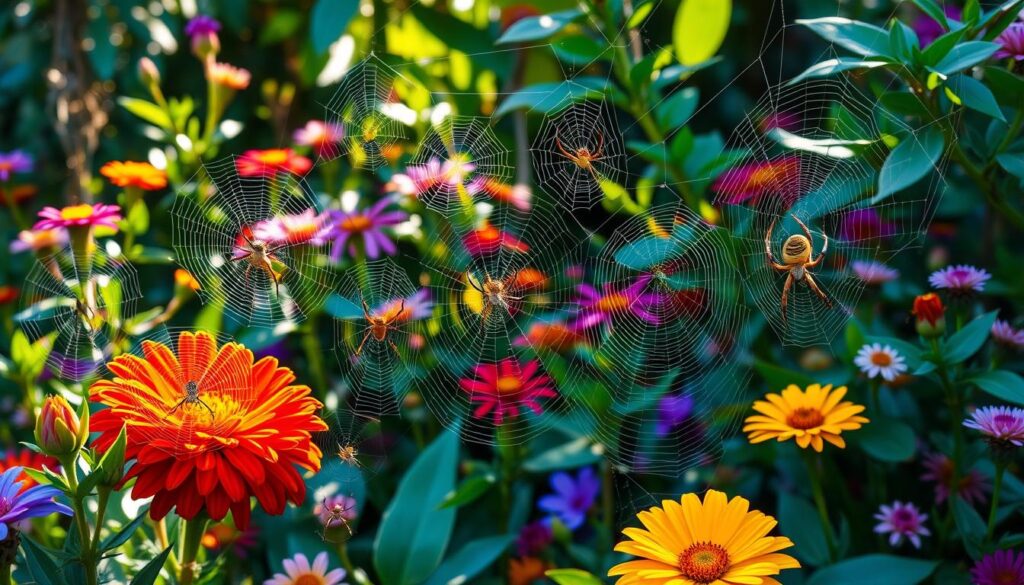
Garden orb-weaver spiders are common in Australian gardens. They are not just interesting to look at but also important for the ecosystem. They help keep the balance of nature by being both hunters and prey.
Redback Latrodectus Hasselti
The redback spider, known as Latrodectus hasselti, is feared in Australia. It’s easy to spot because of its black body and red or orange hourglass on its belly.
These spiders belong to the widow family and have strong venom. Their bites can hurt a lot, cause muscle spasms, and even nausea. About 10,000 people get bitten each year, but deaths are very rare, with the last one in 1955.
Redback spiders breed a lot, with one female laying hundreds of eggs. They can live in cities and the countryside, making them a big problem. It’s important for people to know how to spot and get rid of them to stay safe.
| Redback Spider Facts | Statistics |
|---|---|
| Approximate number of redback spider bites per year | 10,000 |
| Last recorded fatality from a redback spider bite | 1955 |
| Number of eggs a single female redback spider can produce | Hundreds |
| Risk level of redback spider bites | Rarely fatal, but can cause severe symptoms |
Even though redback spiders are dangerous, we can handle the risks. Knowing how to identify them and prevent bites helps. By understanding redback spider latrodectus hasselti and redback spider facts, we can live safely with them.
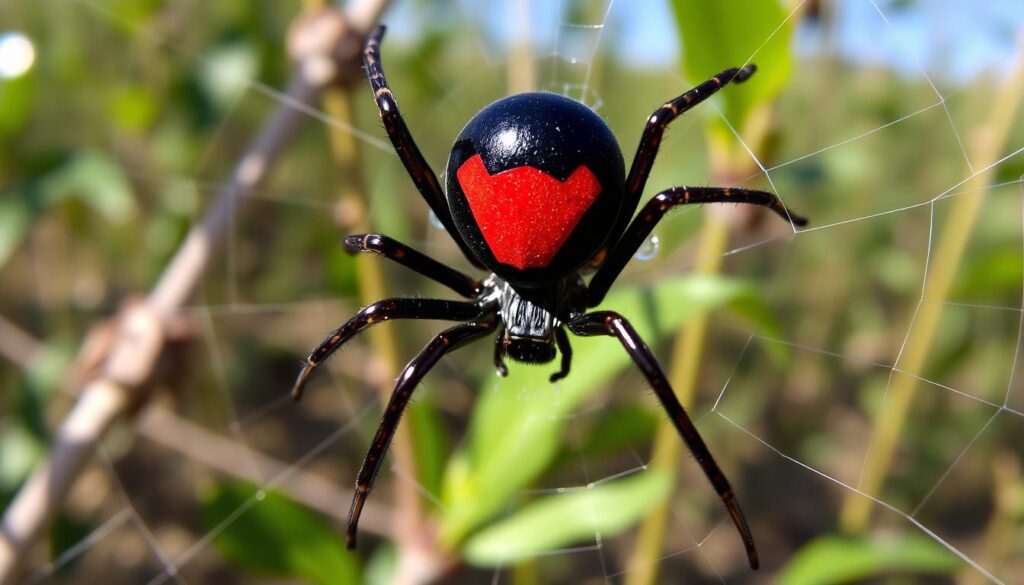
Orb-Weaver Spiders in Australia
Australia is home to many orb-weaver spiders. These spiders are known for their round webs. They come in different shapes, sizes, and colors. You can find them in both city gardens and the bush.
The Joro spiders are bright yellow. Other species have more subtle colors. These spiders are important in Australia’s ecosystem.
Some orb-weaver spiders might look scary, but they’re not usually dangerous to humans. Their venom is strong, but it’s not harmful enough to cause serious problems. Their bites are similar to a bee sting’s pain. Still, it’s best to keep a safe distance from them, as they can get defensive if they feel threatened.
The variety of orb-weaver spiders in Australia is amazing. They range from big and bold to small and detailed. Some are brightly colored, while others blend into their surroundings. All of them are known for their beautiful, round webs.
| Orb-Weaver Spider Species | Characteristics |
|---|---|
| Joro Spider | Vibrant yellow color, legs up to 4 inches long |
| Garden Orb-Weaver Spider | Intricate web patterns, found in urban and rural areas |
| Banana Spider | Large size, striking yellow and black coloration |
When you see them in your garden or on a bushwalk, remember the amazing diversity of orb-weaver spiders in Australia. By understanding and respecting these spiders, we can appreciate their role in the Australian ecosystem.
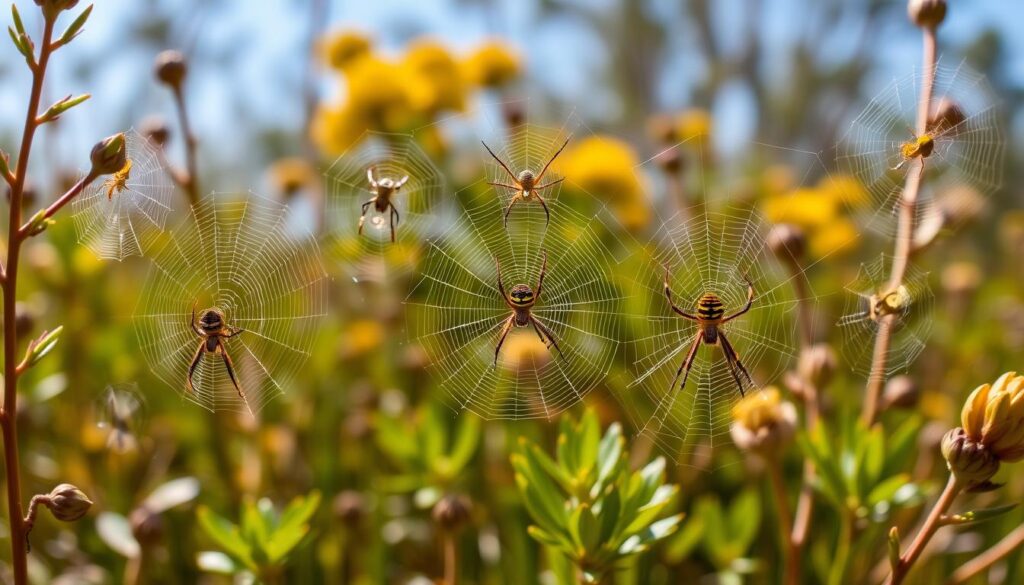
Spider Safety Tips for Australians
Australia is home to many spider species, some of which are very venomous. It’s important for Australians to stay safe from spiders. By following a few simple tips, you can lower your chances of spider encounters and stay safe.
First, learn to identify the more dangerous spider species in Australia, like the Sydney Funnel-web Spider and the Redback Spider. Know their looks and habits so you can avoid them. Always keep a safe distance and never try to touch or disturb them.
Also, pay attention to your surroundings, both inside and outside. Check your home for spider hiding spots, like dark corners and storage. Wear protective clothes, like long pants and boots, when you’re in the garden or outdoors.
